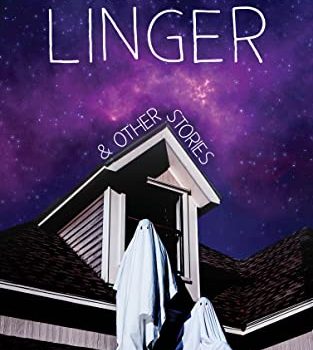Caren Gussoff Sumption Reviews Where You Linger and Other Stories by Bonnie Jo Stufflebeam
 Where You Linger and Other Stories, Bonnie Jo Stufflebeam (Vernacular 978-1-95228-322-2, $19.00, 284pp, tp) July 2022.
Where You Linger and Other Stories, Bonnie Jo Stufflebeam (Vernacular 978-1-95228-322-2, $19.00, 284pp, tp) July 2022.
I have to admit, as I read Bonnie Jo Stufflebeam’s new collection, Where You Linger and Other Stories, I had two reactions: one as a reader, the other as a writer. As a reader, I couldn’t put the collection down – a definite deviation from how I usually parse a short story collection or anthology, as I customarily like to take pauses, think and digest, cleanse my palate, and then move on. From the first page of the first story, Where You Linger grabbed me by the throat and sat on me until I read the whole book. Then, I read it all again.
As a writer, I wanted to toss the collection across the room, sell all my belongings, renounce the world, and live out the rest of my days in seclusion. Maybe learn to play guitar. I don’t know. Something else, other than writing, because there is absolutely no point. That’s how good this collection is.
Now, this should shock no one. Stufflebeam is well published and award nominated. But I still will proclaim: No collection has any business being this good, start to finish.
The stories are all connected – this has been done before – but not quite in the way Stufflebeam has layered the connections in Where You Linger. We move back and forth between shared locations (fictional small towns of creepy Agape and suffocating Riddle TX), in and out of the lives of the same characters (especially Cathryn, the world’s most desired young woman), and back and forth in time (from an almost recognizable present to a near future). It takes a few stories before the overlay becomes apparent, but once it does, the build-up is masterful, and adds depth to stories already read.
The liminality of the world, however, is apparent from the first story, ‘‘Skeletons’’. Wherever we are is almost our world – where college friends who have all slept together go glamping and get drunk, and children and their parents seek mutual understanding (in ‘‘The Mammoth’’) – but is, simultaneously, very much not here. Animated skeletons of animals, including those long extinct, exist as pets and in the wild. A woman is literally split in half over the pain and sacrifice, as well as excitement and possibilities, involved in moving far from home and family to live with their girlfriend, in ‘‘The Split’’. Lifelike androids with cruelly planned obsolescence populate the streets, women time-travel back into their formative relationships, and one piece takes the idea of ‘‘cuteness aggression’’ to an unexpected, but logical, conclusion.
As a subgenre, slipstream is rarely used to its best effect, using disorientation and whimsey as tools of critique. Stufflebeam builds and then uses her uncanny world to frankly – unblinkingly – depict some of the most painful bits of our actual world, such as heartbreak, fear, and the horrors of living inside systemic injustices.
If her created environment is a tool, it is a hammer – and understatement are the nails. Stufflebeam uses subtlety to highlight the pain in the stories, in contrast to the emotional exaggeration and hyperbole as norm that we, in this present, are awash in (to wit: open an email, and you’ll find exclamation points choking out full stops, or witness how a mundane post receives comments of no-fewer than ten emoji hearts). Restraint, here, counterintuitively gives emotion back its punch. In this way, Stufflebeam stands on the shoulders of other story writers who have used this to great effect, such as Kij Johnson and Lorrie Moore, while having a voice and style that is uniquely hers.
Of all the stories in the book, it was hard to choose a stand-out. That being said, ‘‘They Come In Through The Walls’’ was the gut-punch. Claire (a repeating character) has become a full-time caregiver for her father, who has dementia. She’s recently broken up with her girlfriend, so Claire contends with her father slipping away on her own – until phantoms, gray ghost-like creatures, begin joining Claire and her father for supper every night. The phantoms’ presence irritates and confuses Claire, but soothes her father, for reasons that only become clear when we understand that the phantoms are her father’s lost memories, his regrets, and his hopes, and their presence is preparing her father for the end of his life. The story concludes with a moment of clarity for the father, of connection between daughter and father, and then, of course, the father joining the phantoms and leaving this reality for another. Whether or not readers have had the personal experience of caring for a dying family member or friend, the bittersweet relief, abject grief, and disorientation is palatable here, in a perfect marriage of that unreality and understatement that frame the collection.
Caren Gussoff Sumption is a writer, editor, Tarot reader, and reseller living outside Seattle, WA with her husband, the artist and data scientist, Chris Sumption, and their ridiculously spoiled cat-children.
Born in New York, she attended the University of Colorado, the School of the Art Institute of Chicago, Clarion West (as the Carl Brandon Society’s Octavia Butler scholar) and the Launchpad Astronomy Workshop. Caren is also a Hedgebrook alum (2010, 2016). She started writing fiction and teaching professionally in 2000, with the publication of her first novel, Homecoming.
Caren is a big, fat feminist killjoy of Jewish and Romany heritages. She loves serial commas, quadruple espressos, knitting, the new golden age of television, and over-analyzing things. Her turn offs include ear infections, black mold, and raisins in oatmeal cookies.
This review and more like it in the August 2022 issue of Locus.
 While you are here, please take a moment to support Locus with a one-time or recurring donation. We rely on reader donations to keep the magazine and site going, and would like to keep the site paywall free, but WE NEED YOUR FINANCIAL SUPPORT to continue quality coverage of the science fiction and fantasy field.
While you are here, please take a moment to support Locus with a one-time or recurring donation. We rely on reader donations to keep the magazine and site going, and would like to keep the site paywall free, but WE NEED YOUR FINANCIAL SUPPORT to continue quality coverage of the science fiction and fantasy field.
©Locus Magazine. Copyrighted material may not be republished without permission of LSFF.






